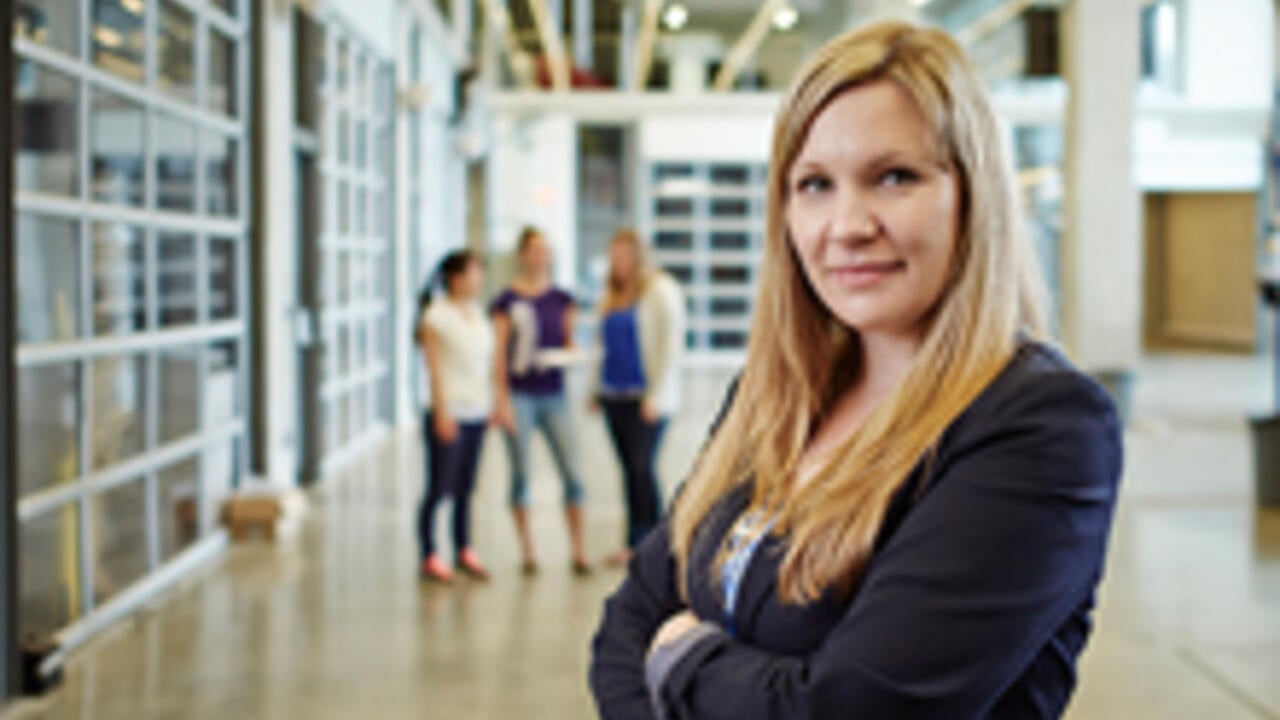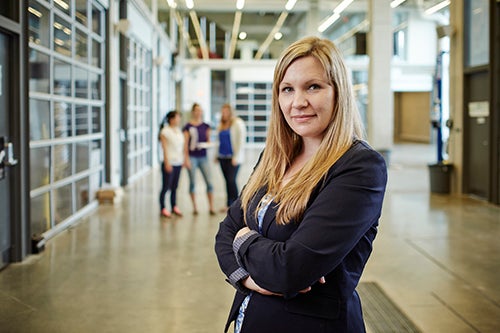
Small changes produce dramatic results for women in engineering
Grades are 10 per cent higher for female engineering students who attend a brief session about transitioning to engineering, Waterloo study finds

Grades are 10 per cent higher for female engineering students who attend a brief session about transitioning to engineering, Waterloo study finds
By Beth Gallagher Marketing and Strategic Communications
Christine Logel visits the Sedra Student Design Centre, a state-of-the-art 20,000 square foot facility that is home to over 20 of the Faculty of Engineering student competition teams.
While educators and business leaders struggle to attract and retain women in science and engineering, a team of psychology researchers have proven that small interventions can produce dramatic results.
A recently published study in the Journal of Educational Psychology found that female engineering students who attended an hour-long session during their first year in a male-dominated engineering program, had an average that was 10 per cent higher than young women who didn’t attend.
“We now have enough science to understand women’s under representation and underperformance in engineering, says study co-author Christine Logel, a psychology professor at the University of Waterloo’s Renison University College. “Women have the same potential to succeed in engineering fields as men. But they have very different experiences than men, which can cause them to underachieve. The research demonstrates that a small tweak can be all it takes to launch these bright, motivated young women into engineering careers.”
The study, which involved 280 male and female engineering students, also found that the women who attended the sessions had a greater sense of belonging in the engineering program and more stable self-esteem than women who didn’t get the training.
The research team included Mark Zanna and Steven Spencer, both professors in Waterloo’s Department of Psychology and Jennifer Peach, a graduate student. The lead author is Gregory Walton, a psychology professor at Stanford University who spent two years as a post-doctoral fellow at the University of Waterloo.
The young women studied were those enrolled in engineering programs where fewer than 20 per cent of the students are women - programs like electrical, software and mechanical engineering. Of the study participants in these male-dominated programs, the women’s academic average hovered around 65 per cent while young men had an average of 75 per cent, says Logel. Female students who attended a treatment session, saw their average rise to 75 per cent, equivalent to men, whereas women in the control group finished their first year with a 65 per cent average.
Engineering students were randomly assigned to one of two treatment sessions or to a control session. The treatments tested two different ways to support women in engineering programs. In each, women and men in their first term in engineering watched a presentation in which upper-year students described their own experiences in first year.
In the first intervention, the “social-belonging” treatment, the stories the upper-year students told communicated that setbacks and adversity are normal and temporary in engineering.
In the second intervention, the “affirmation training” treatment, upper-year students described how they learned to recognize when they were under stress and then affirm areas of their lives outside of their studies that are rich and rewarding - everything from music and sports to their relationships with friends and family. After the presentations, study participants did writing tasks designed to help them process the message and apply it to their own experiences.
The research team tracked the students through surveys after the interventions and discovered that the female students who attended the two sessions were also better at handling stressful events and their self-esteem was more stable than those young women who didn’t attend the sessions.
Logel will present her findings at a the Science, Technology and Gender Conference being held at the University of Waterloo from August 10 until August 13. The conference, which will address gender equity in science and technology sectors, is the largest of its kind in the world.
More than 170 experts will be on hand to discuss their research. “This conference is the leading international gathering for scholars of gender and science,” says Sarah Richardson, a historian and philosopher of science at Harvard University who will be speaking at the conference. “Waterloo has summoned it renown in science studies, gender studies and public engagement with science, to launch the largest conference to date.”

Read more
Here are the people and events behind some of this year’s most compelling Waterloo stories

Read more
From a return to in-person celebrations to health and technology breakthroughs, we look back on some of the year’s highlights

Read more
The Waterloo student team building the world’s first functional pneumatic hyperloop levitation system will share major milestone
The University of Waterloo acknowledges that much of our work takes place on the traditional territory of the Neutral, Anishinaabeg and Haudenosaunee peoples. Our main campus is situated on the Haldimand Tract, the land granted to the Six Nations that includes six miles on each side of the Grand River. Our active work toward reconciliation takes place across our campuses through research, learning, teaching, and community building, and is co-ordinated within the Office of Indigenous Relations.